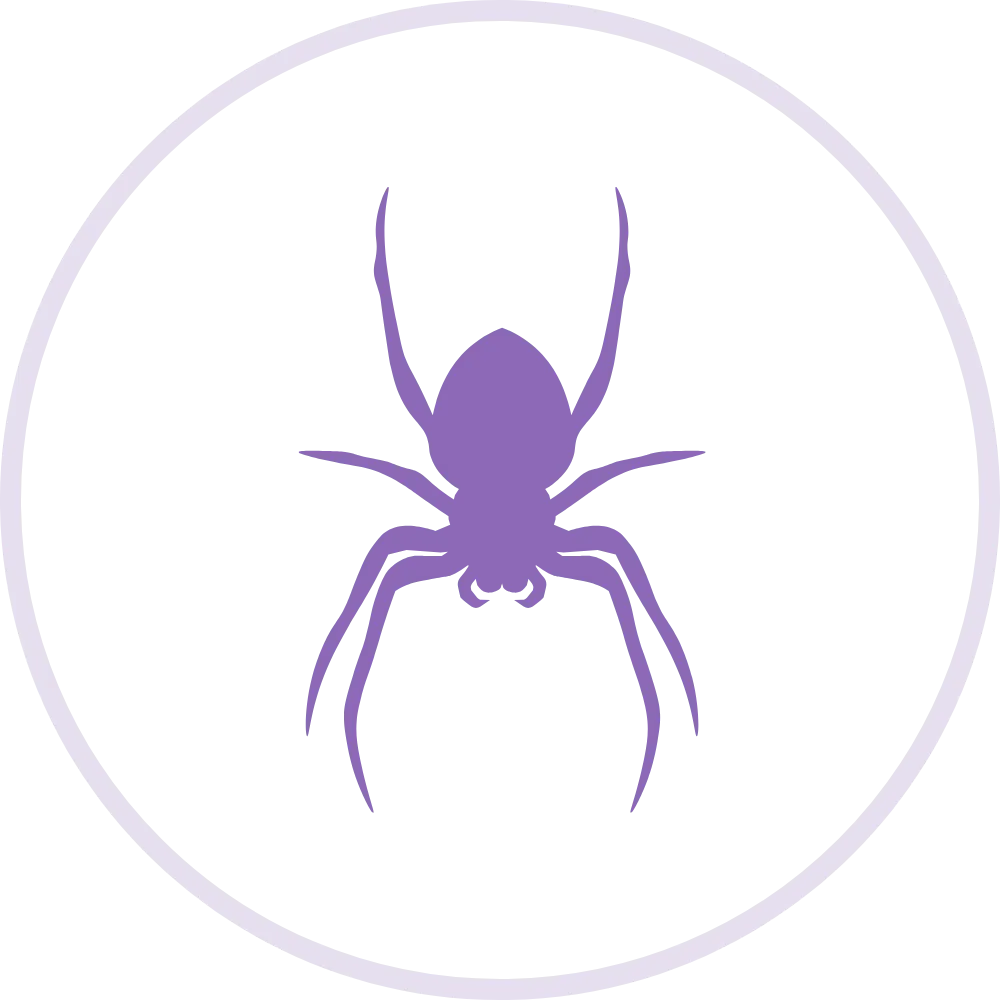Spiders
Few things cause nightmares like these


Spider Pest Control
Spiders belong to the arachnid family, a group of joint-legged invertebrates that also includes scorpions, ticks, and mites. They inhabit a wide range of terrestrial environments, spanning from deserts and rainforests to your very own backyard.
With over 48,000 known species, spiders exhibit considerable diversity in size, shape, color, and behavior. Most feature eight legs, venom-injecting fangs for prey subjugation, and the ability to produce silk for web construction or shelter formation.
Playing a crucial role as predators in numerous ecosystems, spiders aid in regulating populations of insects and other arthropods. While certain species possess venom and may pose a threat to humans, the majority are benign contributors to nature's equilibrium.
Can Spiders be dangerous?
Yes. While most spider species pose no threat to humans, some can be potentially dangerous. Spiders utilize venom to immobilize their prey, and although the majority have venom that is harmless to humans, a select few can induce serious health complications if they bite.
Among the well-known hazardous spiders are the black widow and the brown recluse. Black widow spiders, found in various regions globally, can inflict symptoms ranging from muscle pain and cramps to respiratory difficulties and, rarely, fatalities. Brown recluse spiders, native to the United States, may cause symptoms like pain, swelling, fever, and tissue necrosis.
It's crucial to understand that encounters with dangerous spiders are infrequent, and most spider bites do not harm humans. Typically, spiders only bite in self-defense when feeling threatened, preferring to flee if given the chance. If residing in areas with hazardous spider populations, it's advisable to learn how to identify them and take precautions to prevent encounters. In the event of a spider bite with unusual symptoms, immediate medical attention is recommended.
Spider Pest Control Tips
If spiders are a concern in your home or workplace, there are steps you can take to minimize their presence:
Maintain cleanliness and declutter: Spiders tend to hide in cluttered areas, so keeping your surroundings tidy can discourage them.
Seal entry points: Spiders can enter through small cracks and gaps, so sealing any openings in walls, windows, and doors can prevent their access.
Utilize essential oils: Certain essential oils like peppermint and eucalyptus are known to repel spiders. Placing a few drops on cotton balls and positioning them in spider-prone areas can deter their entry.
However, in cases of severe infestation or when dealing with dangerous spider species, seeking assistance from professional pest control services may be necessary. If you require spider extermination services, feel free to contact us today.
Need Help?
Contact us anytime with the form below and we'll reach out asap. We will call from a 208 phone number.
Frequently Asked Questions
Is your service okay/safe for my kids and pets?
Of course! Our trained technicians will ensure good communication with you and your family to ensure that you are safe 100% of the time.
Are you a local company?
Yes, we aren't one of the massive pest control companies that have crazy contracts and huge call centers. We are local here in North Idaho and are a family business.
What services does Spud Pest control provide?
Spud Pest Control covers a wide variety of bugs. We offer multiple services that our highly trained technicians are skilled in treating and removing. Our services cover pests that are commonly seen throughout the year as well as bugs that are active during different seasons of the year. Common pests we handle include wasps, ants, spiders, rats, and mice. If you aren’t sure whether or not we can take care of your pest problem, give us a call.
Do you offer a guarantee?
Of course! We're super confident in our ability to take care of you pest problem. If the pests come back so do we!
Do you spray inside and outside of my house?
Certainly! Yes, our standard procedure usually includes both interior and exterior treatments during your initial service. However, we're more than willing to accommodate indoor treatments during any subsequent visit.
Can I take care of my pest problem myself?
While there are instances where retail products may provide temporary relief, they often fall short in preventing future infestations. Moreover, many of these products pose safety risks to your family and pets if not used correctly. The optimal approach is to schedule a home inspection appointment, enabling the implementation of a tailored treatment plan designed to address the issue effectively and safely.
How soon can I expect results from your treatment?
Typically, you can expect a decrease in pest activity within a few days after treatment. However, there are instances where the number of visible pests may initially rise before subsiding over one to two weeks. Each pest responds uniquely to treatment. We'll be happy to schedule complimentary additional follow-up services to address any persisting concerns.
